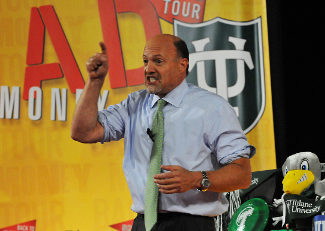Meet the New Boss, Same as the Old Boss
President Trump recently nominated current Federal Reserve System Governor Jerome Powell to be the next Chairman of the Fed’s Board of Governors, replacing Janet Yellen when her four-year term expires. It’s a puzzling move for a President who was elected based on popular anger at the Washington establishment, and who promised to drain the swamp. As Powell’s nomination demonstrates, it’s business as usual in Washington.
Powell’s resume is as establishment as they come. Born in Washington, DC, he graduated from Princeton, got his law degree at Georgetown, and then went to work in New York City, winding up at Dillon, Read & Co., an investment bank that eventually became part of UBS. He becomes the first Federal Reserve Chairman with an investment banking background, which should please Wall Street.
One benefit of Powell’s nomination is that it puts to rest the idea that someone needs to be a Ph.D.-holding economist to be able to comment on matters of economics or economic policy. After all, if the person put in charge of the economy isn’t an economist then an economics degree can’t be all that necessary. But while it’s certainly true that a Ph.D. isn’t necessary to the position, a knowledge of economics is. That’s why reports that Powell will likely lean heavily on Federal Reserve staff for policy recommendations are disconcerting.
As is well-known, the economics profession and monetary economics, in particular, is dominated by the Federal Reserve. The overwhelming majority of monetary economists either work for the Fed, have worked for the Fed, or have been the beneficiaries of the Fed’s scholarships, fellowships, or other contracts, and it has been that way for decades. That means that Chairman Powell will be receiving opinions from economists whose views have been shaped completely by the institution they work for and that he chairs.
Their opinions on economic policy won’t lead them to the conclusion that sound economics will, that the cause of financial crises is central bank monetary policy. They won’t ever put the blame for inflation on the Fed’s shoulders for all the money it creates out of thin air. No, inflation to them is some mysterious phenomenon whose causes are unknown, that bedevils the economy and which only the Fed has the tools to combat.
In short, Chairman Powell won’t receive any different advice than any other Fed Chairman ever has, nor will he act any differently than any Fed Chairman ever has. He will continue to engage in monetary policy, completely oblivious to the harmful effects it has on the economy. While President Trump has another three openings on the Fed’s Board of Governors that he can fill, his choice of Powell as Chairman doesn’t inspire any confidence that his picks to the other open Governor slots will be any better.
What could have been a great opportunity to shake up the Fed and get critics of Fed policy into key positions will be completely squandered. The bipartisan establishment view that the Fed is necessary to ensure financial stability will continue to remain entrenched. And when the next financial crisis occurs, the Fed’s policymakers will be just as lost as they were in 2008.

